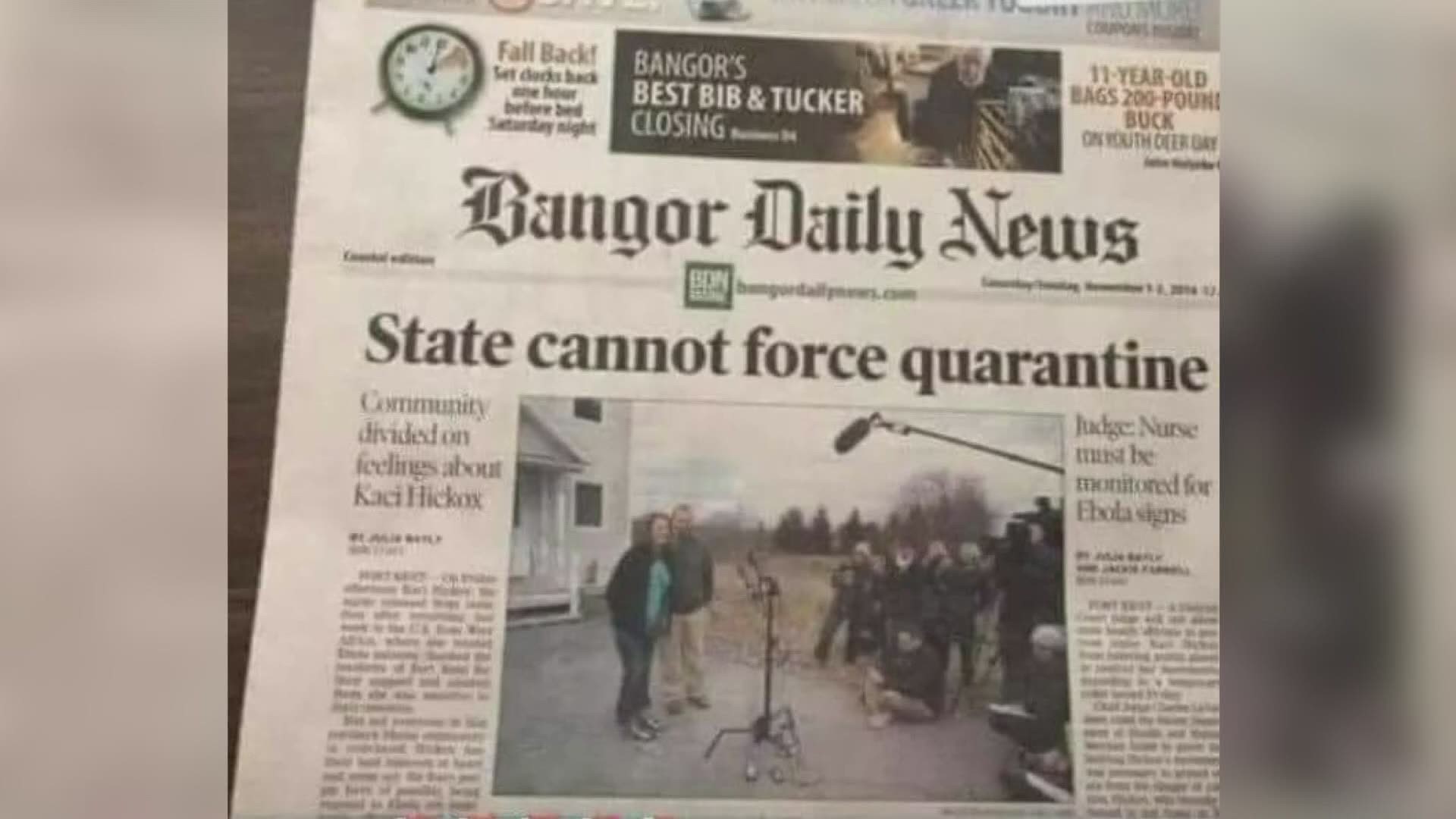MAINE, USA — A woman in Maine is put under a mandatory quarantine because of the possibility she may have become infected with a deadly disease. That's the kind of story that grabbed headlines six years ago.
These days, those two words, “mandatory quarantine,” still dominate the news, but on a much larger scale.
Right now, an old newspaper headline about a woman’s fight against a mandatory quarantine is circulating online and it's raising questions about the state's right to require people to quarantine.
The post is a snapshot of an issue of the Bangor Daily News from 2014. The bold headline reads: "State Cannot Force Quarantine."
The front-page articles are all about Kaci Hickox, a nurse from Fort Kent who returned to the U.S. after treating people with the Ebola virus in Sierra Leone. She did not have any virus symptoms. The LePage administration wanted her to quarantine for 21 days.
On October 31, 2014, a judge ruled the Maine Department of Health and Human Services failed to prove that limiting Hickox's movements, aka quarantining her, was necessary to protect others from contracting Ebola.
That said—she was still required to limit and report all travel and was still subjected to regular monitoring, including daily symptom checks and visits by public health officials.
Fast forward about 6 years and we're in the midst of the global COVID-19 pandemic.
Through an executive order, Governor Janet Mills has mandated a 14-day quarantine for anyone who comes to Maine from certain states or from overseas, Mainers included.
The reason the Hickox story is going viral in 2020 is to compare how then-Attorney General Janet Mills responded to the state’s attempt to quarantine Hickox.
Included with the photo of the headline is a caption that says, “A little blast from the past for all you Mills’ lovers.. 2014 was the year! Janet Mills as AG sued Governor Paul LePage when He wanted to quarantine Hicks when Ebola was a big threat. Look at the Papers headlines. My how the tables have turned.”
The caption is factually inaccurate. Mills did not sue Governor Paul LePage. In fact, the attorney general’s office presented the state’s argument in favor of quarantine before the court. Only later did Mills publicly say she agreed with the court’s ruling.
However, the post’s primary message holds true: In 2014, the state ruled it could not force Hickox to quarantine due to concerns of Ebola, while today the state is mandating people quarantine due to COVID-19.
So what makes these instances different?
UMaine Law Professor Dmitry Bam says a crucial difference is, right now, the state is in a civil state of emergency, which allows the Governor additional powers.
Bam says, “Before the legislature left, it declared an emergency and gave the Governor some additional powers, and of course the Governor declared an emergency under the powers that had previously been given to the governor… So, to a certain extent, the procedure itself provides a safeguard.”
The other crucial difference, according to Bam, Ebola and COVID-19 are very different viruses.
Studies show Ebola spreads through bodily fluids and only by people showing symptoms.
“The government's action has to be tailored to the problem it's trying to fix,” says Bam. “So the courts have generally required the government to go through some kinds of steps to show there's a need for the quarantine.”
So while the state could not legally require Kaci Hickox to quarantine following her possible exposure to the Ebola virus, today, the governor has the legal authority to mandate quarantine because of her executive 'emergency order powers' and scientific data which shows quarantine is effective at limiting the spread of COVID-19.
--
At NEWS CENTER Maine, we’re focusing our news coverage on the facts and not the fear around the illness. To see our full coverage, visit our coronavirus section, here: /coronavirus
NEWS CENTER Maine Coronavirus Coverage

